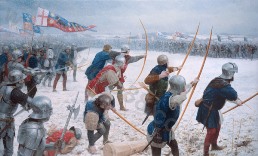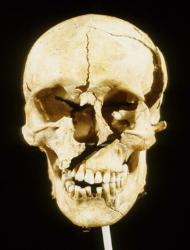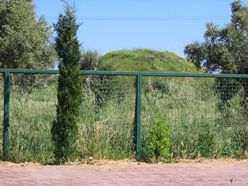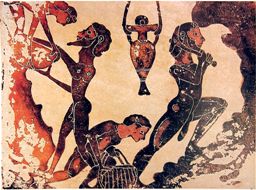Heroic Historical and Uncomfortable Truths

People often quote LP Hartley (without having any idea they’re quoting him, or who he was, me included) — “The past is a foreign country: they do things differently there.”
To an extent you can take a tourist attitude and go, “Look at the funny foreigners. How romantic!”
Distance in time fosters distance in morality, making it — for example — entirely acceptable to offer Battle of Towton greetings cards. A winter battle. How positively Christmassy!
Or for the Scottish Borders Council to adopt the Border Reiver as a logo.

Oddly, I don’t see any Battle of Kursk greetings cards, nor do any European cities flaunt the propeller-engined bomber as a brand identity.
However, it is the job of Historical Fiction of all flavors to not be a gaping tourist. We readers and writers must get down on the ground and engage with the past. This is not always a comfortable experience.
For example, Ancient Athens.

As a student, I once stood at the Athenian burial mound at Marathon and wept.
OK, it was a long hot day, my Greek hosts had filled me with Amstel, so my reaction was — perhaps — a little exaggerated by fatigue and alcohol.
Even so, years later, when I think of that place, the hairs stand up on the back of my neck.
The Athenians weren’t elite soldiers like the Spartans, they were shopkeepers, potters, merchants and farmers, ordinary folk not so different from the people I grew up with in Edinburgh (“Athens of the North”, by the way).
Yet these un-epic little men stood shoulder-to-shoulder, shield-to-shield, and made mincemeat of the rest of the known world.
And that kind of phalanx they used? It works on trust. Once it starts to crumble, you’re all dead. Imagine trusting 9,999 other men well enough to face numerical odds of 3 to 1? No, I don’t apologize for my tears.

However, I have difficulty reconciling my awe for the Athenian citizen soldiery — and for their literature and architecture as well — with what I know about Athens and the Athenian culture. Leave aside the dodgy foreign policy and politics, forget the way Pericles plundered the treasury of the Delian League to build the architectural treasures we so admire, and pass over the Massacre of Melos. Let’s focus on the day-to-day.
At Marathon, the Athenians fought for freedom, however they were a slave-owning culture. We’re not just talking domestic and agricultural slavery — like the Vikings — where the slave is merely on the bottom rung of a familial hierarchy. No, we’re talking full on industrial exploitation of slaves. In the aftermath of Marathon, the heroic Themistocles opened up the silver mines at Laurium. Tens of thousands of slaves. Short life expectancy, squalid conditions. A rolling atrocity. And that’s where most of Athens’ wealth came from.
Then there’s the unpleasant status of Athenian women. Sure there were high class courtesans like Aspasia, mistress of Pericles, who had a measure of freedom and influence in a patriarchal world. However most Athenian women lived an incredibly cloistered and subordinate existence. For those with husbands rich enough to support the lifestyle, there was no answering the door, no hanging out with male guests, and not much getting out and about.

Finally, there was routine infanticide. I don’t even want to think about that.
Exploited slaves, oppressed women, murdered babies… on close inspection, Athens doesn’t quite seem so shiny.
Most other pre-modern cultures are at least that bad and usually pile on other issues for modern sensibilities: piracy and raiding as hobby, homophobia as virtue, human sacrifice as piety, gladiatorial combat as public entertainment, rape as sport, eunuch creation as industry, genocide as policy, aristocracy as license, class system as pyramid scheme, chevauchee as war…
Sometimes history books make me want to pull up the drawbridge, count my children, and hug my modernity.
When such moods strike, I generally tuck into Space Opera or Swords and Sorcery, two genres that can emulate stirring historical scenarios without the icky bits; we can refight Marathon, but with feisty warrior women in our midst, and no slaves waiting at home.
However, a thousand Helm’s Deeps cannot equal the power of one Marathon and sooner or later I find myself cheering on the good/bad guys, and feeling slightly queasy about it.. again.
M Harold Page (www.mharoldpage.com) is a Scottish-based writer and swordsman. Download his Dark Age adventure yarn Shieldwall: Barbarians! from Amazon (UK link).
All of the problems you list then exist to an ever greater degree in the last 100 years.
1) slavery? Check. We just call it human trafficking. And that’s not even to mention those stuck working in developing world sweatshops.
2) infanticide? Check. We just hide that behind euphemisms too.
3) genocide? Check. Countless millions sacrificed on the altars of communism and nazism, not to mention those less dramatic slaughters in places like Armenia and Rwanda.
4) Class and economic equality? Need I even talk about that?
You get my point.
Modern man is just as fallen as ancient man, if not more so. The only difference is that modernity, in its incredible arrogance, rejects all human wisdom that came before us.
Tyr (great user name, btw – I hope you saw my Viking Metal piece), yes; people in the future may look back on us and go – “I just can’t enjoy the Rolling Stones because… well, misogyny.”
However, for me, the difference is that we don’t tend to see sweat shop owners and human traffickers as rugged heroes, and we also portray people like Hitler as the villains.
The wisdom, and shear bloody minded ruggedness, of our forbears… well, there are good reasons for studying History and writing historical fiction. That’s worth a blog entry of its own.
The sad ability of modern folks to forget or strip away the brutal truths of the past and replace them with sentimental, claptrap is disheartening.
[…] read, and yet not pretend that pre-modern societies are anything but structurally unpleasant. It needs to take you on a flight of fancy, but ground you in the familiar. And, given that we live […]
[…] These are sometimes uncomfortable truths. But, like Harold Lamb before him, Holland does not judge. Rather he alternately watches with interest or claps his hands with glee. Imagine if Brian Blessed’s Voltan, King of the Hawkmen wrote a history of Mongo and you have Holland’s attitude. […]
[…] Heroic Historical and Uncomfortable Truths […]
Great piece. Reminds me of a few conversations we’ve had 🙂
@paedarog Thanks! Looking forward to a longer conversation some time. Come to Edinburgh!